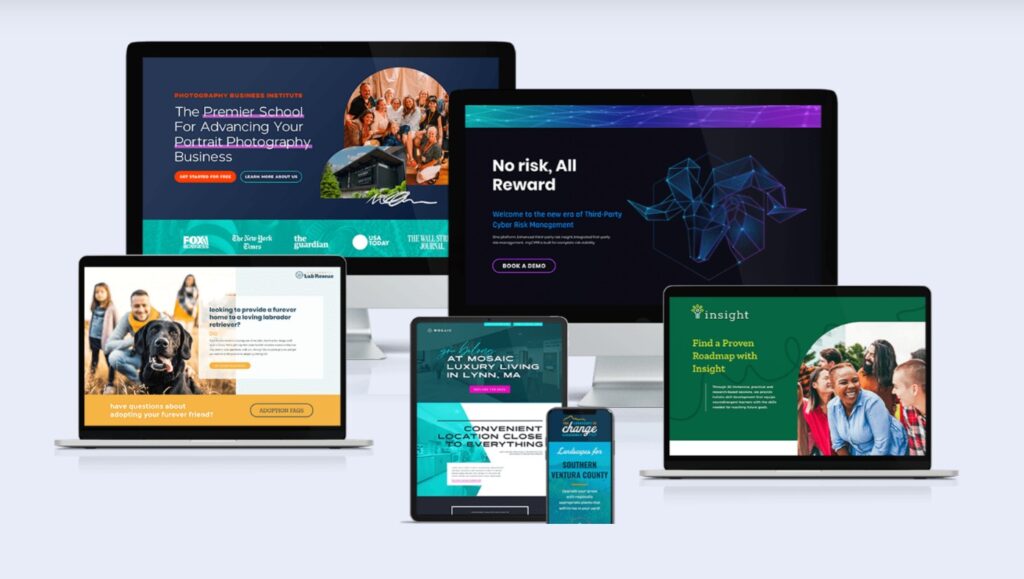Discover how customization transforms your website and impacts your business growth.
Your website is often the first impression people have of your business. For companies debating between a custom or template website, this choice has significant consequences—affecting everything from brand perception to how well your site caters to your unique needs.
But what does “customization” really mean in web development, and why does it matter so much?
In this in-depth guide, we’ll explore what a customized website truly is, how website customization differs from pre-built templates, and how key decisions around functionality, design, and budget shape your online presence. By the end, you’ll have a clearer understanding of what option will serve your business best.
What Is a Customized Website?
A customized website is built specifically for your business, catering to your exact needs, goals, and preferences. Unlike template sites—which rely on pre-existing structures and designs—customized websites are crafted from the ground up or heavily modified to suit your brand and needs.
Key Characteristics of Website Customization
- Unique design tailored to your brand
- Custom-built features and functionalities
- Enhanced user experience specific to your audience
- Scalable structure for future growth
Think of a customized website as a tailor-made suit versus buying off the rack. Off-the-rack (templates) might fit okay, but custom fits you perfectly, accentuating your best attributes.
Customization vs. Template Websites: What’s the Difference?
Understanding how a customized website differs from a template-based one is vital for making the right decision for your business.
Visual Design: Unique Brand Identity or Standard Look
Templated Websites:
- Come with pre-designed layouts.
- Easy to launch and cost-effective.
- Risk of looking like many other sites using the same template.
Customized Websites:
- Developed with your unique brand, colors, and messaging in mind.
- Stand out with personalized graphics, custom fonts, and meaningful imagery.
- Can tell your brand’s story in a way that resonates with your audience.
Example:
A boutique law firm using a template may appear similar to dozens of other firms. With customization, it gets a website that visually conveys trust, sophistication, and credibility—values core to its business.
Functional Flexibility: Out-of-the-Box vs. Tailored Experiences
Templated Websites:
- Offer basic functionality (contact forms & blog layouts).
- Good for standard informational needs.
- Limited in adding unique or complex features.
Customized Websites:
- Built to handle complex needs—membership portals, booking systems, custom e-commerce experiences, integrations with CRMs or proprietary software.
- Can optimize site speed, accessibility, and navigation for your particular clients.
Example:
An event company needing automated booking and ticketing might struggle with a template but thrive with customized plugin and workflow solutions.
Scalability and Growth
Template Websites:
- Difficult to scale beyond original scope.
- Customization options are often restricted by the underlying platform.
Customized Websites:
- Designed with future expansions in mind.
- Easier to add new features, pages, or integrations as your business evolves.
Case Study:
A local retailer launching online sales might quickly outgrow a template, needing features like real-time inventory syncing and custom payment gateways which are feasible with customized sites.
The Layers of Website Customization
Customization can vary in depth and scope, depending on your business requirements. Let’s break down the main layers:
1. Design and Graphics Customization
- Unique graphics and illustrations tied to your branding
- Flexible layouts responding to different devices and customer behaviors
- Custom animations, hover effects, and interactive elements
- Brand-consistent icons, infographics, and photography
This level affects how memorable and trustworthy your business appears. For brands in competitive niches, standing out visually can be a key differentiator.
2. Functional Customization
- Custom forms—multi-step applications, quote builders, or customer surveys
- E-commerce features—subscriptions, advanced filtering, complex product variations
- Integrations—connecting with marketing platforms, analytics tools, or proprietary business systems
- Tailored user flows—for members, event registrations, or gated content
With functional customization, your website can mirror how your business actually works, supporting unique sales processes, workflows, or service delivery.
3. Content Management Customization
- Flexible CMS (Content Management System) structure for easier updates
- Custom post types for case studies, team bios, portfolios, events, or resources
- Role-based access so different users can edit specific sections
This ensures your team can efficiently update the site without web development expertise.
How Customization Impacts Your Website Budget
One of the main decisions businesses face is how much to invest in their website. Customization comes with different cost structures, and it’s important to weigh these alongside your business goals.
Cost of Template Websites
- Lower upfront cost—thanks to pre-built layouts and limited change options
- Quick to launch—saves on labor and turnaround time
- Recurring fees—for template licenses, sometimes paid monthly or yearly
Cost of Customized Websites
- Higher initial investment—due to unique design, coding, and testing requirements
- Long-term ROI—custom sites are easier to extend, optimize, and own fully
- Potential savings—in reduced maintenance costs, and fewer limitations on growth
Budgeting Considerations:
- How unique do you want your business to appear?
- What features will you need both now and as you grow?
- Is brand differentiation important in your market?
- How might a more personalized user experience impact your customer conversion rates?
For a more in-depth breakdown on pricing and value, see our article “How Much Should a New Website Cost?” on the Simply Styled Sites blog.
Real-World Examples: Customization in Action
Custom Design Enhancing Brand Trust
A financial advisory firm wanted a website conveying trust, sophistication, and innovation. Off-the-shelf templates looked generic and didn’t support their content structure. Through custom design and subtle animations aligned with their values, website visitors spent 35% more time exploring their services.
Functionality Tailored to Service Delivery
A fitness studio needed online scheduling, membership management, and virtual class streaming—all integrated seamlessly. Template options couldn’t combine these efficiently. Custom development allowed for flawless booking, automated reminders, and member dashboards, boosting retention rates by 20%.
Content Management at Scale
An educational nonprofit routinely updated resources, events, and volunteer profiles. Custom CMS tools gave their team non-technical controls, ensuring site updates stayed current without bottlenecks or extra development costs.
When Should You Invest in a Customized Website?
Custom Websites Make Sense If You:
- Need unique features or business workflows
- Operate in a competitive niche
- Want a strong, memorable brand identity
- Expect the site to scale or adapt over time
- Prioritize accessibility, performance, or SEO
Templates are a good fit for low-budget, quick-launch, or early-stage projects—think “business card” websites or simple portfolios.
However, if your business’s reputation, customer experience, or operational efficiency depend on your website, investing in customization is often the smarter, long-term choice.
Frequently Asked Questions
What is a customized website?
A customized website is uniquely designed and developed to fit your branding, functional needs, and user experience goals, rather than relying solely on pre-made templates. These sites can include exclusive features, custom designs, and seamless integrations that support business growth.
Is a customized website always better than a template?
Not always. Templates are cost-effective and fast to launch—ideal for simple needs or tight budgets. Custom websites are better when you need unique designs, advanced features, or are planning for long-term growth.
How does customization affect website performance and SEO?
When done correctly, customized websites are often faster, more accessible, and easier to optimize for search engines. Custom coding allows for SEO best practices, image optimization, and clean site structure, which templates may struggle to offer. For best results, follow the best practices from leading SEO authorities like Semrush.
How long does it take to build a customized website?
Custom websites typically take longer—anywhere from 6 weeks to several months—depending on site complexity. Templates can be set up in days or a couple of weeks.
Can I update a customized website myself without coding skills?
Yes! Simply Styled Sites are built with WordPress and have tailored admin panels, so your team can easily update text, images, or add new pages without much technical expertise. We provide personalized training and clients have additional resources exclusive to them in our portal for on-demand references.
Key Takeaways
- Customization in websites affects everything: from design and branding to how your site works for your unique business needs.
- Templates offer speed and cost savings: but may not offer needed flexibility, distinction, or scalability.
- Customized websites empower your business: to stand out, adapt, and grow efficiently online.
- Budget should be balanced with goals: Consider your specific requirements, competitive positioning, and long-term vision.
- Custom functionality and design drive better user experiences: and can boost trust, engagement, and conversions.
Conclusion
Choosing between a template or a customized website is a pivotal step for any business. While templates are great for getting started, a customized website can propel your brand above the competition, deliver unique customer experiences, and scale alongside your success.
Are you ready to elevate your online presence with a truly unique website? Contact Simply Styled Sites today to discuss how a customized solution can help your business grow. Visit our site build packages to see how we transform brands with custom website solutions or reach out via our contact form for a free consultation.
For more tips and inspiration, explore our comprehensive resources on the Simply Styled Sites blog. Let’s make your website as exceptional as your business!






